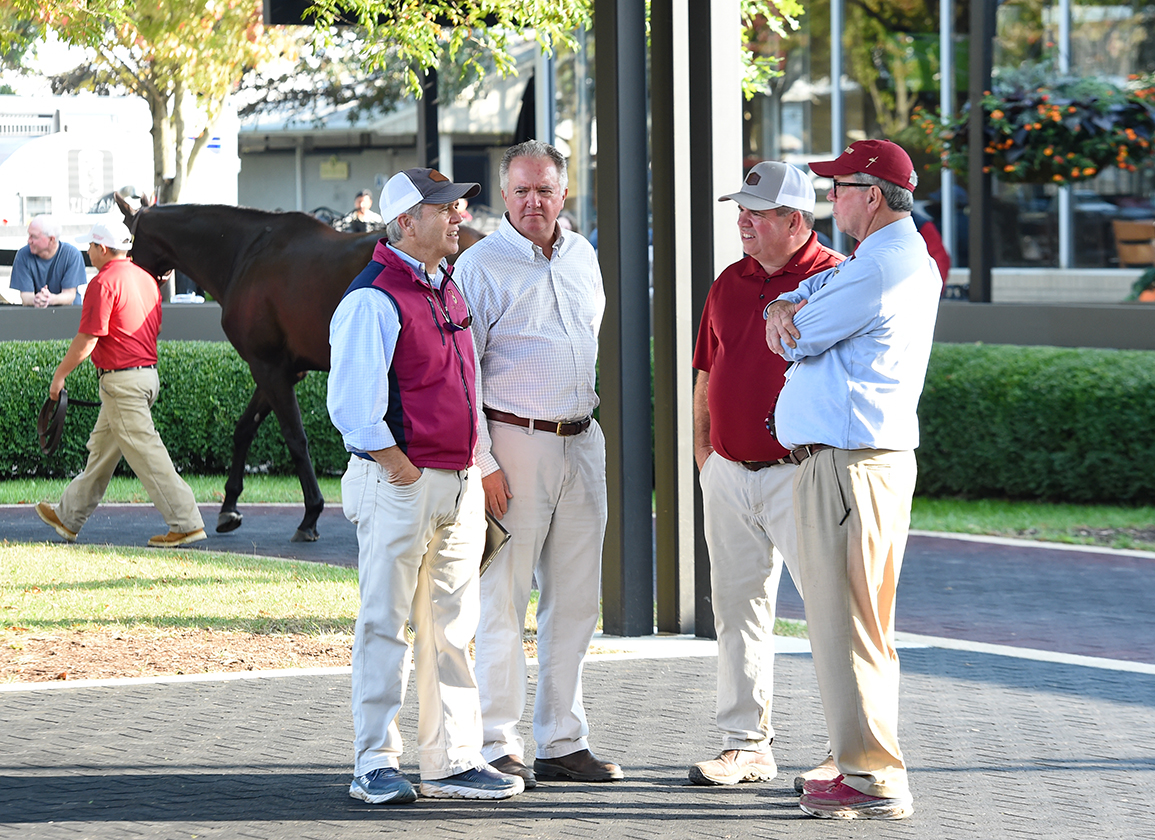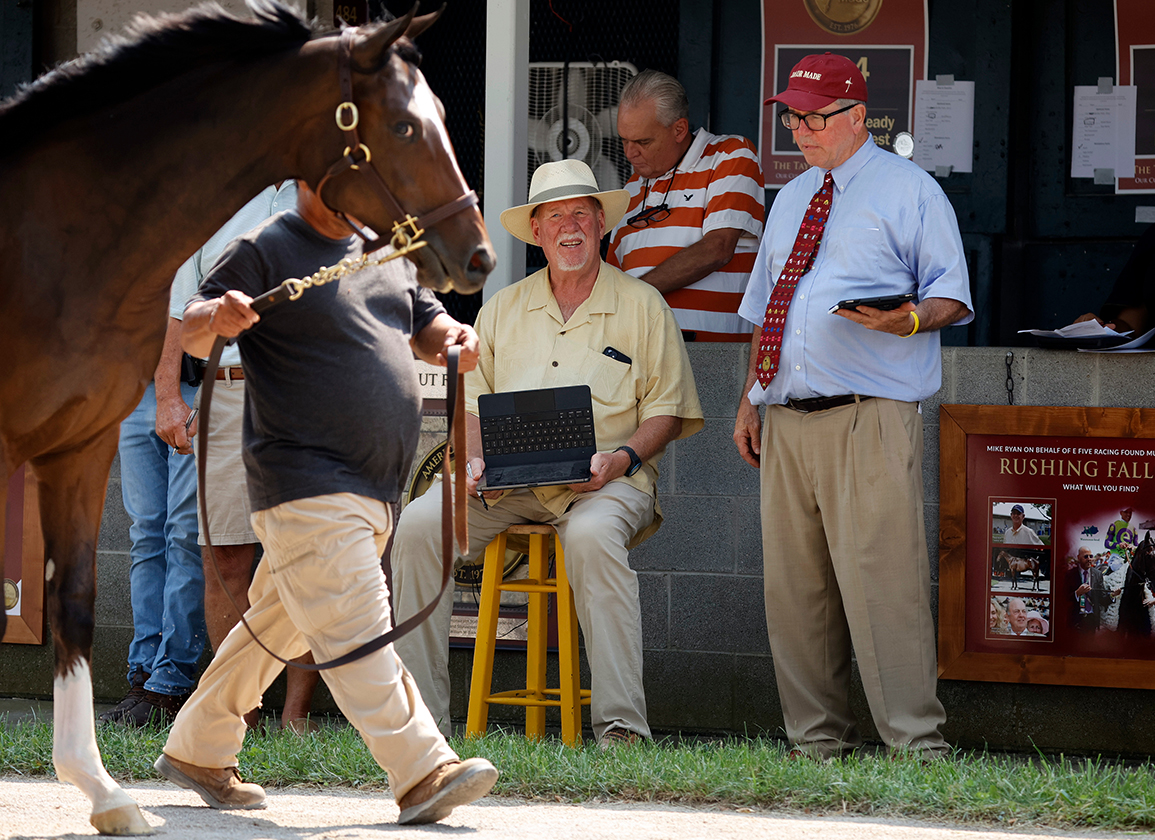When Dazzlingdominika (Ghostzapper) won a May 13 maiden special weight race at Churchill her connections were ready to pounce. The 2-year-old filly had become a hot commodity and they wanted to cash in. In year's past that would have meant selling her privately or waiting for the next horses of racing age sale on the calendar.
Instead, she will be sold Thursday by Fasig-Tipton in a one-horse digital, “flash sale,” a new means of selling horses that promises to make it easier for those looking to move horses fast.
“This seems like a good way to do it,” said Taylor Made's Frank Taylor, who heads the Ready Made Racing LLC ownership group. “It's a good way to get people focused on a horse and sell them when they're marketable and hot. Everyone wants to buy something that just won and everybody wants to buy a Kentucky bred. Hopefully, we can get people focused on this.”
Dazzlingdominika is trained by Will Walden, the son of WinStar CEO and President Elliott Walden. Will Walden got off to a late start to his training career because he had been dealing with substance abuse issues. When his life started to turn a corner last summer and he felt it was time for him to begin training, he felt like he needed something to distinguish himself at the start.
He came up with the idea of buying relatively inexpensive yearlings and running them in maiden races restricted to horses that sold for less than a certain amount at the sales. Dazzlingdominika was bought at Keeneland September for $30,000. The race she won at Churchill, which was her second career start, was restricted to horses that sold or RNA'd for $45,000 or less in the their most recent auction. Should they win one of those maiden races or show signs of promise they would be sold. It was a new take on pinhooking, selling yearling buys not at the 2-year-old sales but after they had distinguished themselves in races for 2-year-olds. Taylor came on board as his principal owner and formed Ready Made Racing.
“We came up with a game plan six, seven months ago,” Walden said. “In order for Ready Made to do this again next year we have to sell these horses in order to raise money to go the sales again. This has been the plan all along. We aren't selling the ones we don't like and keeping the ones we like. Everything in my stable is for sale. That was target goal when I came up with this idea back in August and we mean to see it through.
“Hopefully, I'd like to get to a place some day where the stable gets to recruit 2-year-olds we can race through their careers. Starting out training, we have to take an edge where we can get one. And this was an idea that sounded appetizing to the guys. We wanted to try something new, a different way of pinhooking horses.”
Before pop-up or flash sales came to be, selling Dazzlingdominika would have been a lot harder to pull off. The best way to do so may have been a private sale. That would have required Walden and Taylor to get the word out that the filly was for sale and then field phone calls from prospective buyers.
“Why just take individual phone calls and bat a number back and forth when you can let all the potential buyers bat it out in the ring?” Walden said.
It is not Taylor's first experience with a flash sale. In Fasig-Tipton's first ever flash sale, Taylor sold Sweet Tea (Into Mischief) for $320,000. The broodmare prospect had been owned by late Rick Porter.
“When we sold Sweet Tea it was a big success,” Taylor said. “We're trying it again with this filly. She won impressively and came back well. She's ready to move forward.”
In the case of Dazzlingdominika, prospective buyers will not only have to look at her race record, but project what she might do going forward. Walden believes that her future is bright.
“Personally, I don't train super aggressively,” he said. “I want to sell these horses with their best days in front of them and not behind them. Just like any seller would want, I want these horses to go on and have careers outside of this barn and go on win more races. We've done the bare minimum with her, without running them too unfit or running them unprepared or run in place where they could get injured. We had her ready but haven't tapped into the real meat of the horse.”
The bidding on Dazzlingdominika began Monday. At deadline for this story, the bidding was up to $70,000. The sale closes 2 p.m. (EDT) Thursday.
Taylor said that his team has been working behind the scenes to let as many people as possible know that a nice prospect is about to be sold through the digital sales ring.
“Some people think in a sale like this you don't need an agent,” he said. “Actually, you need an agent more than you would in a normal sale. You can't just throw it out there and say here it is. We have a team calling trainers and buyers, calling people who like to buy these kinds of horses. We've been dialing for dollars all day. We're getting a lot of responses and there's already been a lot of active bidding.”
It's anyone's guess so far as what she will sell for, but whatever it is, it will no doubt represent a healthy profit for her original investors. She cost just $30,000 at the sales, has earned $53,720 on the racetrack and will no doubt sell for six figures.
“This gives you a chance to market a horse when the timing is at the very best,” Taylor said.
With this filly, Walden's plan has worked perfectly, thanks, in large part, to a new way of selling horses.
The post ‘Flash Sale’ a Perfect Opportunity for Ready Made Racing appeared first on TDN | Thoroughbred Daily News | Horse Racing News, Results and Video | Thoroughbred Breeding and Auctions.





